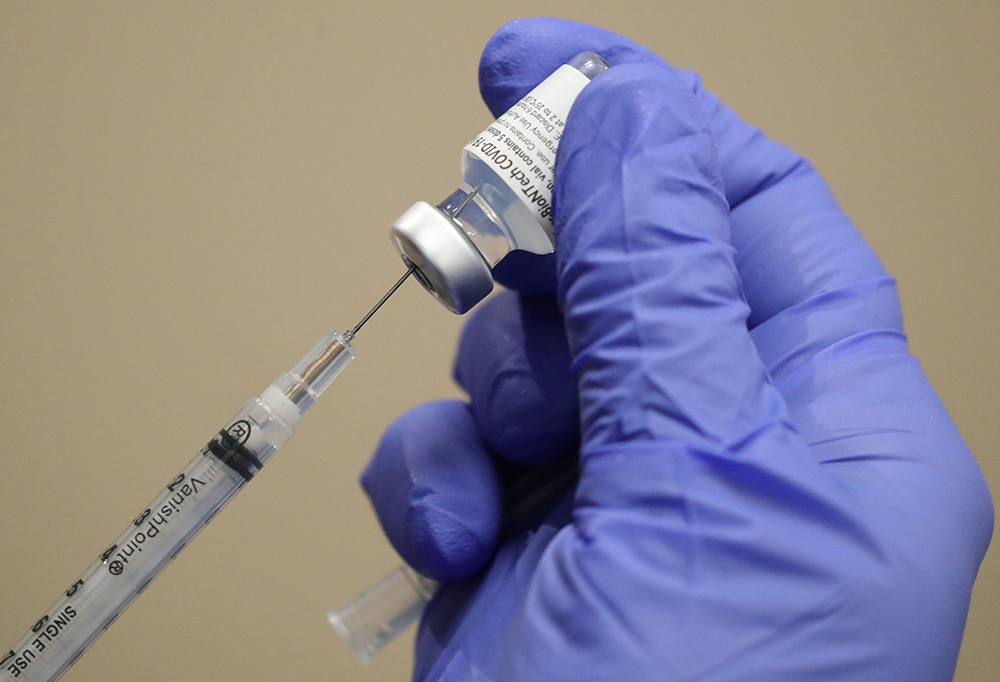
A health care worker at Dignity Health Glendale Memorial Hospital and Health Center in Glendale, California, draws the COVID-19 vaccine from a vial Dec. 17, 2020. (CNS/Reuters/Lucy Nicholson)
As I sit socially distant in a waiting room with other health care workers — custodial, clerical, escort, RNs and medical providers — there is a reverence as we wait for our name to be called to receive the vaccine for COVID-19. I remember those who have died from this horrific virus: lives lost, patients I tried to protect and save, names and stories I will never forget.
I remember patients talking to me one moment and gasping for air the next, stating, "I can't breathe," only to become among the many bodies in our morgue. I remember standing with people as they had one last moment with their family member. The pain, the bewilderment that this virus could be so deadly. I continue to see patients who had the virus during the first wave last spring who still have long-term effects that demand medical care.
This virus is real. This virus is easily transmitted to close contacts, those we love and live with. This virus is deadly and the vaccine I am about to receive is one step, along with the mask I wear everywhere, to stop the spread of COVID-19.
There is a sense of relief that the overwhelming fear and responsibility I have carried for more than nine months to protect the lives of the sisters with whom I live, my family, co-workers, my patients, and those whose names I will never know but met in supermarkets, as I did everything in my power to prevent the spread of COVID-19.
The mask I have worn everywhere has not been to protect me. It is to protect others, to respect their life. It is a sign of concern and care for others. All I have done and been these last nine months has everything to do with we, and little to do with me. My actions are founded in the Catholic doctrine of love of neighbor, some I know, most I do not know but care for as my neighbor.
As I wait to receive the vaccine, I sit humbly with a heart full of gratitude for all who spent tireless hours and worked together to create this vaccine, which has unprecedented efficacy to stop this virus and save lives. I sit in reverence knowing that this vaccine is not only about protecting me. Like the mask I have worn religiously, this vaccine is about stopping the spread of COVID-19; it is about protecting others — my neighbor.
I have a moral obligation to receive the vaccine and to witness to others who are fearful, most notably the people of color I work with and serve. People in racial groups who have been used for medical experimentation in the past are justifiably fearful.
Advertisement
It is my moral obligation to protect and witness that this is about the care of all, not some. Not those chosen but all. Each person who receives the vaccine, just like each person who wears a mask, stops the spread of this highly contagious and deadly disease that continues to kill overwhelming numbers of people each day.
It is my moral obligation to protect others, to stop this deadly disease that has traumatized so many, laid bare our humanity and exposed once again sins that we try so hard to hide: racism, economic disparity, cultural and gender intolerance, individuality at the cost of others.
This is our moment to put into action love of neighbor. Our moment to think of we, not me. Our moment to care for each other in this year that has given us insights and reflection in our own lives and the beliefs we live that affect the lives of so many others.
The U.S. Conference of Catholic Bishops' committees on Doctrine and on Pro-Life Activities said in a Dec. 14 statement, "Receiving one of the COVID-19 vaccines ought to be understood as an act of charity toward the other members of our community. In this way, being vaccinated safely against COVID-19 should be considered an act of love of our neighbor and part of our moral responsibility for the common good."
As we begin a new year, may we take all we have learned from 2020 — this painful yet insightful year — and act with charity and respect for another. May we accept our moral responsibility and move forward as we, not me.
[Mary Catherine Redmond is a Sister of the Presentation of the Blessed Virgin Mary. She has ministered in various aspects of health care and is currently serving as chief physician assistant in hospital emergency medicine, serving the underserved of New York City.]








